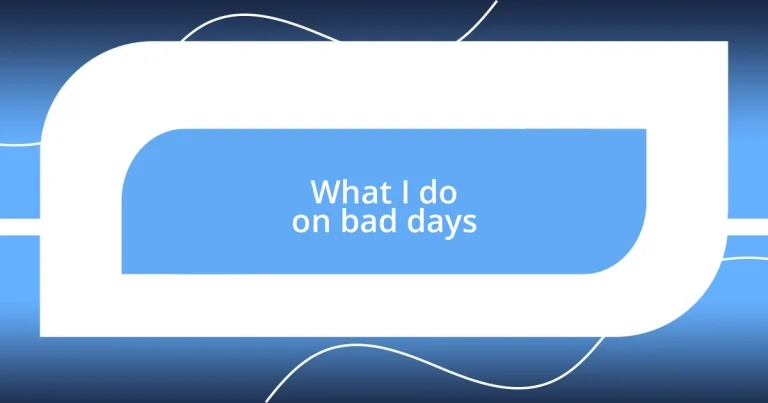Key takeaways:
- Bad days are opportunities for personal growth and self-reflection, signaling the need for self-care and attention to our mental and emotional health.
- Recognizing personal triggers, such as lack of sleep or negative self-talk, enables the development of proactive coping strategies and fosters self-discovery.
- Practicing self-compassion and seeking support from others, along with establishing a flexible recovery routine, can significantly alleviate feelings of overwhelm and foster resilience.
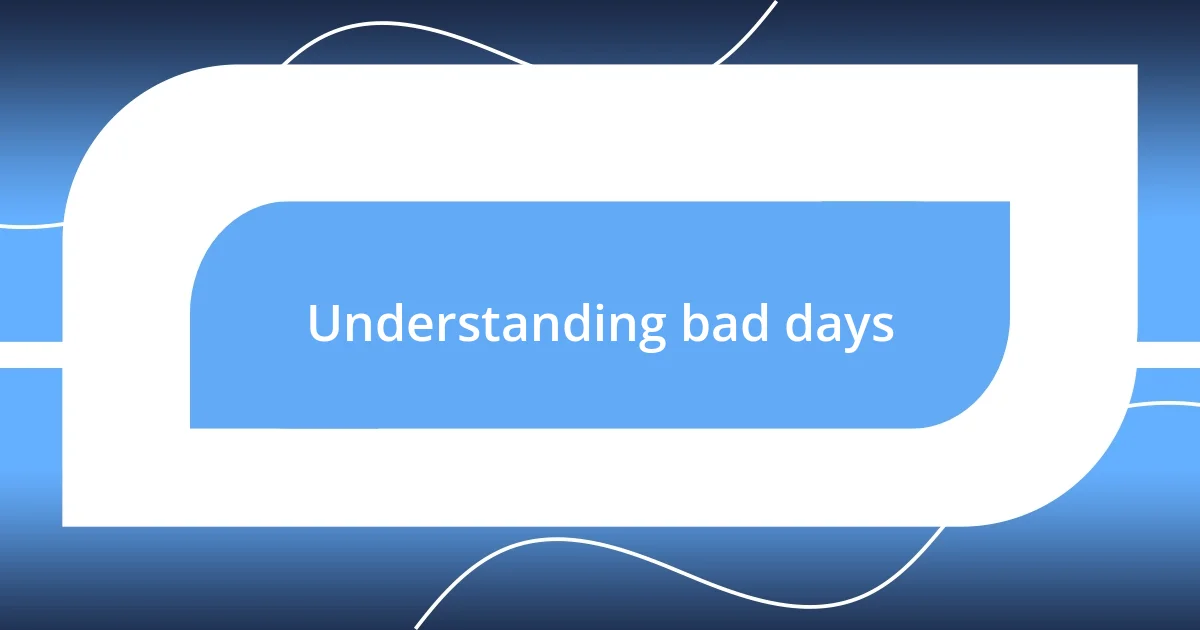
Understanding bad days
Bad days are a universal experience, and they can hit us unexpectedly. I remember one particularly tough day when I spilled coffee on my favorite shirt right before an important meeting. It’s funny how a small incident can snowball into a cascade of negativity, isn’t it?
Often, I think of bad days as a signal from my mind and body that something needs attention. Like the time I felt overwhelmed after neglecting my self-care routine for too long. I realized that acknowledging these feelings is crucial; they can teach us about our limits and remind us to pause and reflect.
It’s important to embrace the idea that bad days often lead to personal growth. Have you ever noticed how overcoming a challenging day makes you feel stronger? For me, it’s like a badge of honor; I’ve conquered a hurdle, and that gives me a renewed sense of purpose.
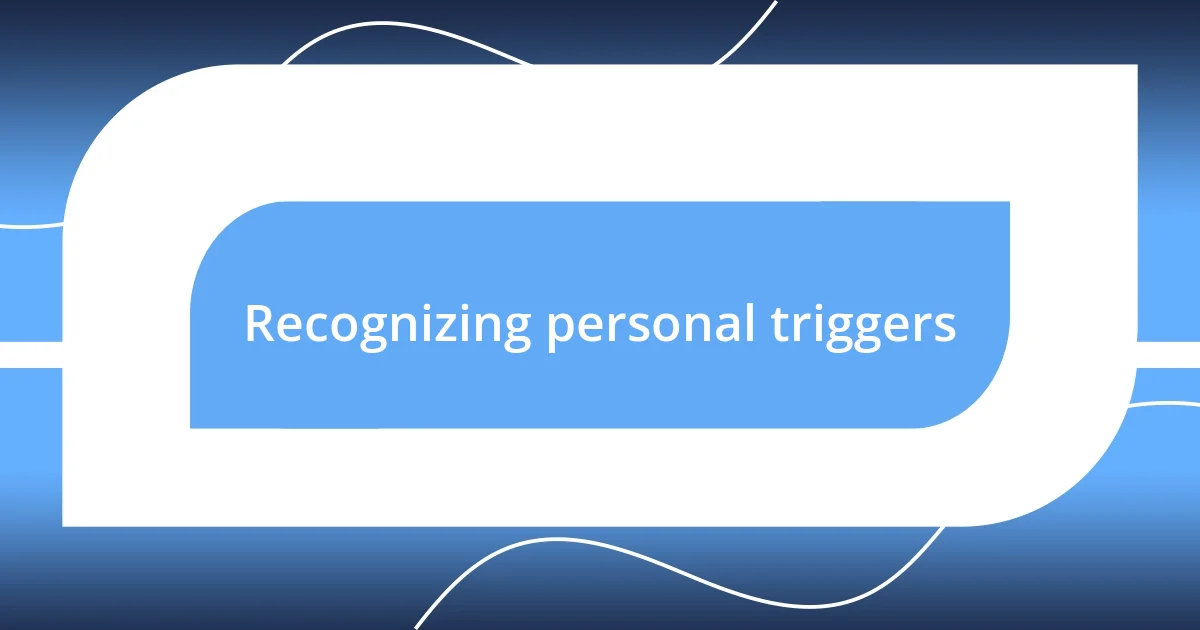
Recognizing personal triggers
Recognizing personal triggers can be a game changer when navigating those tough days. I’ve learned that pinpointing what sets me off often leads to valuable self-discovery. For instance, after a few frustrating incidents at work, I realized that conflict with my colleagues is one of my primary stressors. Once I acknowledged this trigger, I could address it more effectively instead of letting it simmer beneath the surface.
Here are some common personal triggers to consider:
- Lack of sleep: I know firsthand how a restless night can skew my emotions.
- Overcommitment: Saying ‘yes’ too often has led me to feeling overwhelmed and frazzled.
- Change in routine: Even a small shift, like skipping my morning walk, can set off my anxiety.
- Negative self-talk: I often catch myself spiraling into doubt when I don’t combat those harsh inner voices.
- Social media overload: I’ve recognized that too much scrolling can breed feelings of inadequacy.
Understanding these triggers empowers me to create proactive strategies for self-care. It’s like arming myself with tools to better cope when the inevitable bad days arrive.
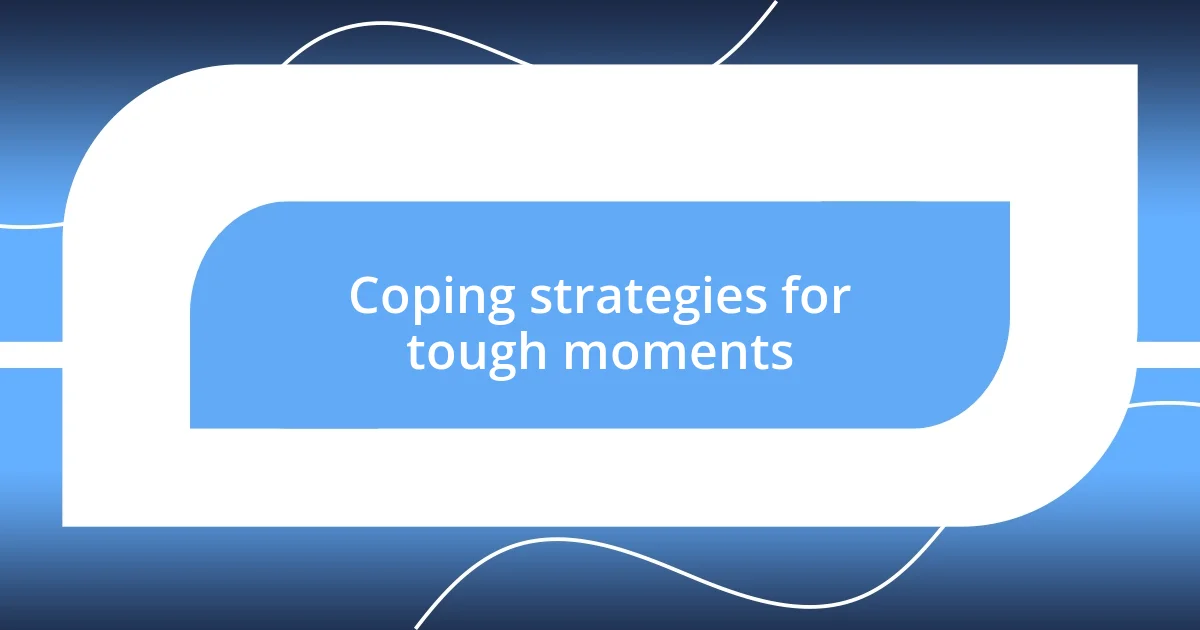
Coping strategies for tough moments
Coping strategies are essential when tough moments arise. One strategy I’ve found effective is engaging in physical activity. On particularly challenging days, even a short walk outside can change my perspective. I remember a day when I was overwhelmed with deadlines. After just a brief jog, not only did my mood lift, but I also returned to my work with renewed energy and focus. It’s remarkable how movement can stimulate both the body and the mind.
Another approach I often use is practicing mindfulness and meditation. It sounds simple, but taking just ten minutes to breathe deeply and clear my mind can be transformative. I recall a stressful week when anxiety seemed to creep in every day. Sitting in a quiet room, focusing on my breath, allowed my racing thoughts to slow down. This time to myself provided clarity and helped me refocus on what truly mattered.
Developing a gratitude practice is also something I’ve integrated into my routine. On bad days, I jot down three things I’m grateful for, no matter how small. I remember one particularly rough morning when everything felt bleak. I wrote down a warm cup of coffee, a sunny day, and a supportive friend. Focusing on positives, even amidst negative moments, has become a lifeline that helps shift my mindset.
| Coping Strategy | Personal Experience |
|---|---|
| Physical Activity | A brief jog refreshed my focus during an overwhelming deadline. |
| Mindfulness/Meditation | Ten minutes of deep breathing cleared my racing thoughts on a stressful week. |
| Gratitude Practice | Listing three positives shifted my mindset on a particularly rough morning. |
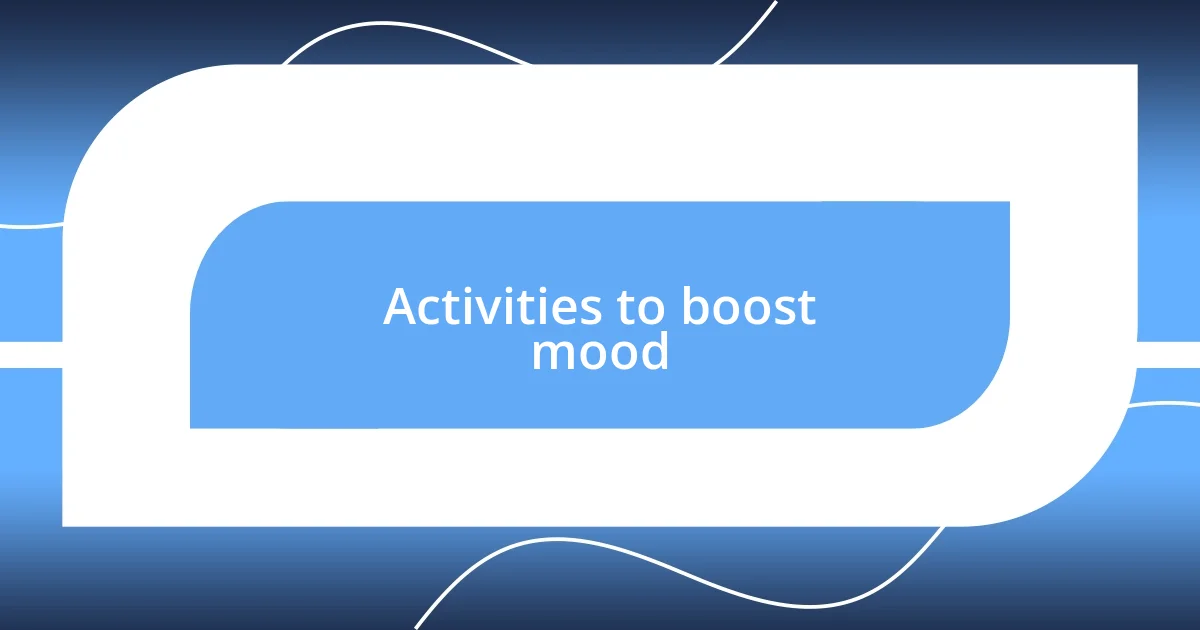
Activities to boost mood
When I feel my mood dipping, diving into a creative outlet can truly lift my spirits. Recently, I found myself yearning for something fresh, so I picked up a paintbrush and let my thoughts flow onto the canvas. It was liberating to express myself that way, and who knew playing with colors could turn a gloomy afternoon into an explosion of joy?
I also find that connecting with nature works wonders for my mood. There was a day when everything seemed heavy; I stepped outside and embraced the crisp air during a hike. I remember feeling an immediate shift as the greenery enveloped me. It’s almost like the earth hums a comforting tune, reminding me that I’m part of something much larger. Have you ever felt that connection?
Another practice I swear by is reaching out to a friend just to chat. During a tough moment the other week, I sent a simple text to a close friend, and we ended up laughing uncontrollably over shared memories. It struck me how vital it is to nurture those relationships, especially when life feels overwhelming. What about you? When was the last time you reached out to someone just to reconnect?
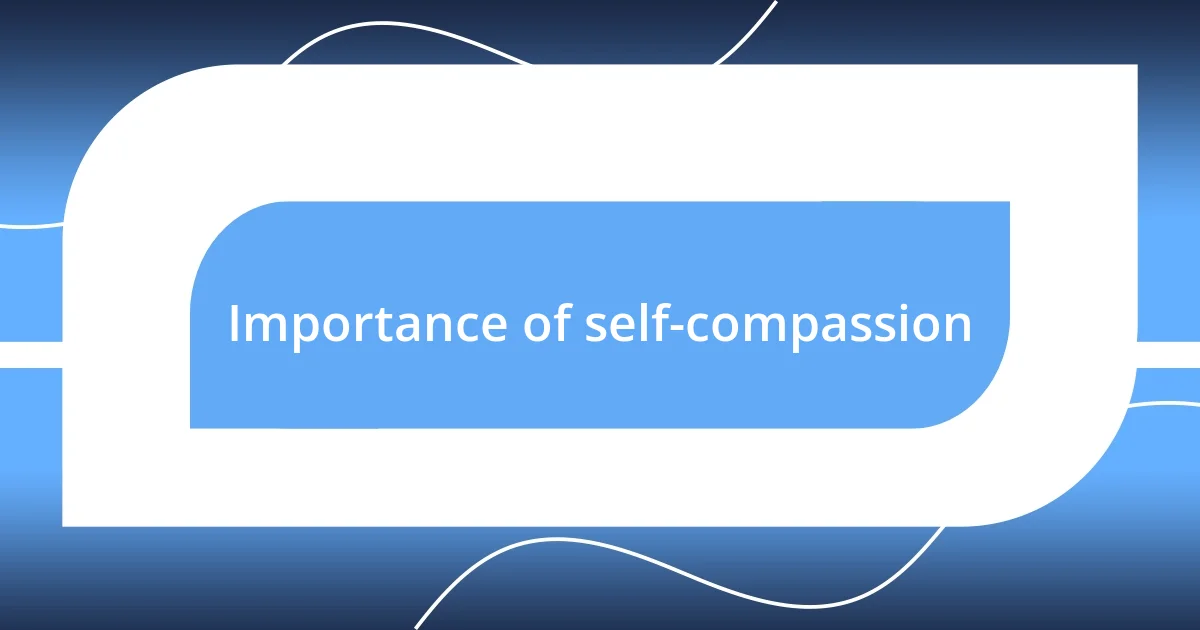
Importance of self-compassion
The importance of self-compassion cannot be overstated, especially on bad days. I’ve had moments when I was my own worst critic, spiraling into self-doubt and negativity. Recognizing that it’s perfectly okay to struggle helped me shift my mindset towards kindness. How often do we berate ourselves for not meeting expectations? I’ve learned that treating myself with the same gentleness I would offer a friend can create a much-needed sense of relief.
Practicing self-compassion can truly transform your inner dialogue. I remember a day when I felt completely defeated after a long week. Instead of wallowing in self-pity, I paused to acknowledge my feelings. “It’s okay to feel this way,” I told myself. Acknowledging that my experience is part of being human reminded me that I wasn’t alone in my struggles. This simple act of acceptance lightened my emotional load and allowed me to scrutinize the situation with clarity.
I’ve realized that self-compassion is not just about being kind; it’s also about understanding our shared human experience. I often remind myself that everyone has bad days. In those moments of discomfort, cultivating empathy towards myself has opened a pathway to healing. Have you ever felt that shift when you suddenly stop judging yourself so harshly? It’s a liberating feeling that invites growth rather than despair.
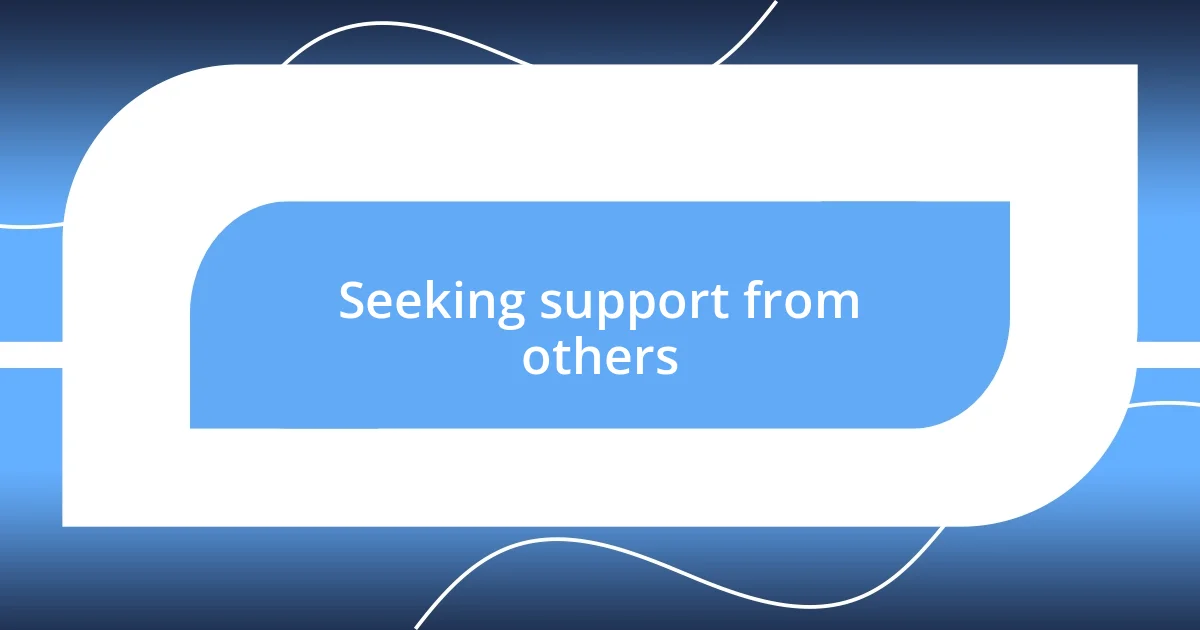
Seeking support from others
Reaching out to others is a powerful way to navigate tough days. I remember one particularly dreary afternoon when I felt like I was carrying the world on my shoulders. I decided to call my mom, and hearing her voice instantly brought warmth into my heart. It struck me how just a few words of support from someone who loves me can turn the tide from despair to hope. Have you ever noticed how a simple conversation can make the weight feel lighter?
When I seek support from friends, it’s often as easy as sending a message. Not long ago, I texted a close friend when I was feeling overwhelmed with work and life. To my surprise, she replied almost instantly, understanding exactly what I was going through. We spent hours chatting about our challenges, sharing laughs and memories that reminded us of brighter days. It’s comforting to realize that vulnerability creates connection; sometimes, you’re not just seeking support—you’re offering it too.
I also find that joining a support group can be transformative. I attended one meeting where strangers shared their own bad days and heartaches. Listening to their stories helped me feel less isolated, almost like we were all holding each other up in those tough moments. The power of community is undeniable; knowing that others share your struggles can be a soothing balm for the soul. Have you ever felt that sense of belonging when you open up to others? It’s astonishing how shared experiences can create a supportive tapestry of empathy and understanding.
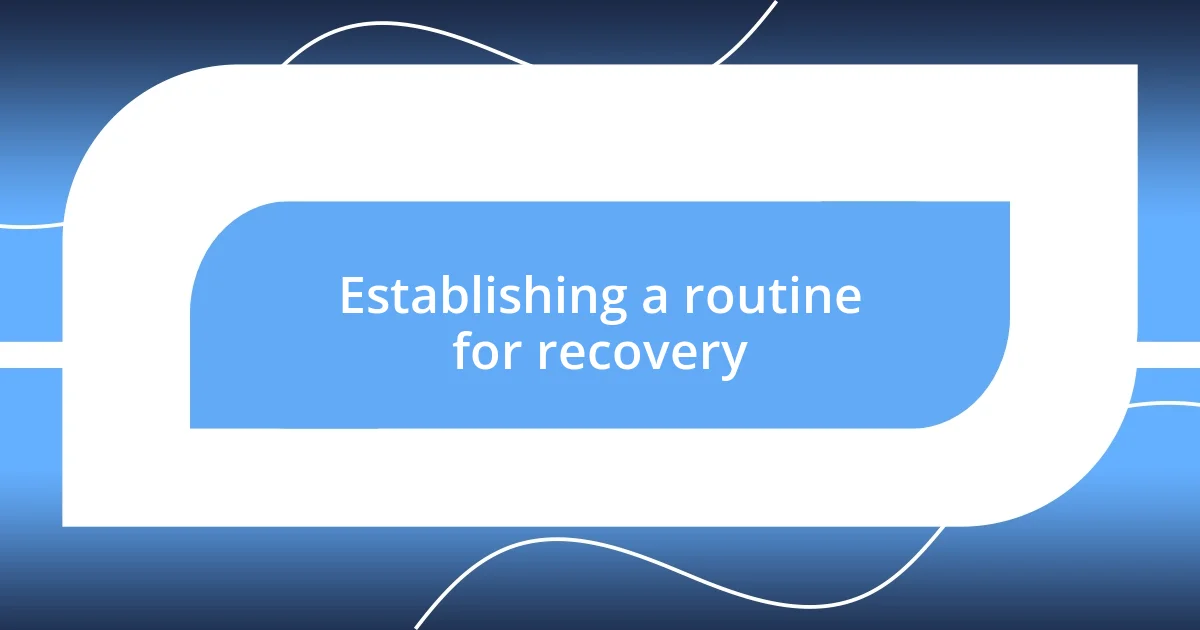
Establishing a routine for recovery
Establishing a routine for recovery is something I’ve come to rely on during tough times. On particularly bad days, I’ve found that waking up at the same time, even when I don’t feel like it, sets a tone of structure for the day ahead. What happens when you don’t have a plan? I’ve noticed that the day can easily slip away into a haze of confusion and lethargy.
Incorporating small tasks into my routine, like taking a walk or practicing a few minutes of mindfulness, has been a game-changer for me. I remember a day when I felt drained and uninspired; pushing myself to step outside for just 10 minutes refreshed my mind and changed my perspective. This simple commitment to my well-being not only offers a distraction but also generates a sense of achievement, no matter how small. Have you ever experienced that rush of energy after completing a tiny task? It’s incredible how those little wins can boost your mood and motivate you to keep going.
I’ve also discovered the importance of flexibility within my recovery routine. Sometimes my emotional state is unpredictable, and the tasks I set can feel overwhelming. On one such day, I decided to modify my schedule, opting for a cozy afternoon with a favorite book instead of the gym. It was a gentle reminder that recovery doesn’t always mean sticking to a strict plan; it can also be about listening to what my body and mind truly need in the moment. How often do we forget that self-care can adapt to our feelings, allowing for growth and healing rather than rigidity?












